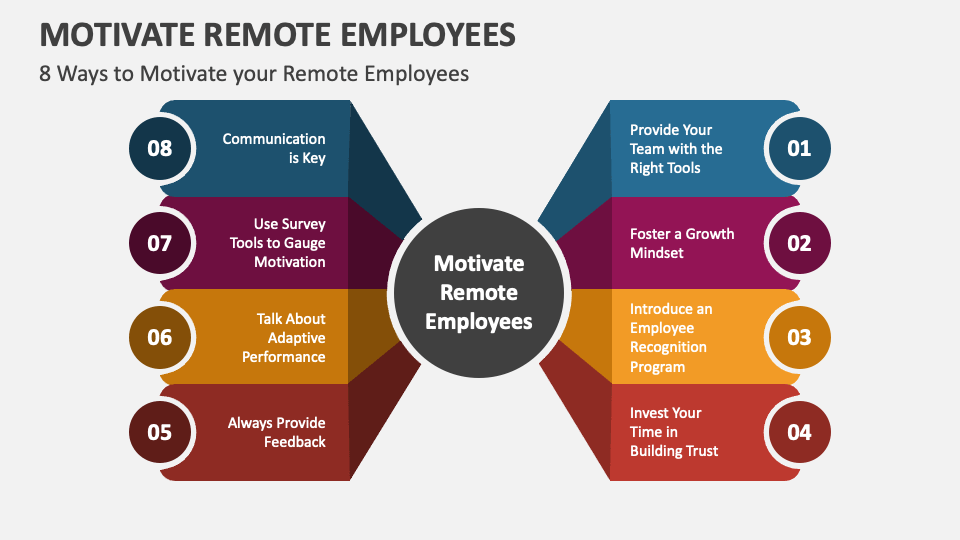How To Motivate Remote Employees?
To motivate remote employees, set clear expectations and goals, maintain open communication and provide regular feedback and recognition for their work. Remote work can be challenging, but by implementing these strategies, you can foster motivation and engagement among your remote team members.
In a remote work setup, it is crucial to ensure that employees feel connected, appreciated, and motivated, as they may not have the same level of face-to-face interaction found in a traditional office setting. By following these guidelines, you can effectively motivate your remote employees and promote a positive work environment where they feel valued and inspired to succeed.

Credit: www.collidu.com
Importance Of Remote Employee Motivation
Remote employee motivation is essential for maintaining productivity and boosting morale. Discover effective strategies to motivate remote employees and keep them engaged in their work.
Introduction: Importance Of Remote Employee Motivation
Remote work has become increasingly popular in recent years, allowing companies to tap into a global talent pool. However, managing remote employees comes with its own set of challenges. One of the key challenges faced by managers is how to motivate their remote team members effectively. Without proper motivation, remote employees may struggle with productivity and engagement, which can ultimately impact the success of the entire team. Therefore, understanding the importance of remote employee motivation is crucial for creating a positive and productive work environment.
Boosting Productivity
Enhancing productivity in a remote work setting is essential to achieving organizational goals. When employees are motivated, they tend to be more focused and driven to accomplish their tasks. Here are a few strategies that can help boost productivity among remote employees:
- Clearly outline expectations and goals: Providing clear guidelines and objectives to remote employees allows them to understand what is expected of them and what they are working towards.
- Establish structured schedules and routines: Encouraging remote employees to maintain a consistent work schedule helps them stay organized and focused on their tasks.
- Promote work-life balance: Remote employees often struggle with maintaining a healthy work-life balance. Encouraging them to take breaks and setting boundaries between work and personal life can prevent burnout and increase productivity.
Fostering Team Engagement
Building a sense of team engagement is crucial for remote employees to feel connected and motivated. Here are some effective ways to foster team engagement:
- Regular communication: Communication is key for remote teams. Frequent check-ins, team meetings, and video conferences help create a supportive virtual workspace.
- Collaboration tools: Utilizing collaboration tools such as project management software or team chat platforms ensures seamless communication and collaboration among remote employees.
- Celebrate achievements: Recognizing and celebrating individual and team accomplishments boosts morale and motivates remote employees to continue delivering their best work.
By implementing these strategies, managers can foster a motivated and engaged remote workforce that not only meets but exceeds expectations, contributing to the overall success of the organization.
Building Trust And Communication
Motivating remote employees involves building trust and effective communication. By fostering an open and transparent work environment, providing regular feedback and recognition, and ensuring clear goals and expectations, employers can inspire and motivate their remote workforce.
Remote work has become increasingly popular, but it can present unique challenges when it comes to motivating employees. Building trust and communication becomes crucial in fostering a positive and productive remote work environment. Without face-to-face interaction, employees may feel disconnected or isolated. Therefore, it is essential to establish clear expectations and maintain open lines of communication to cultivate a sense of trust and promote effective collaboration. Here’s how you can achieve this:Establishing Clear Expectations
- Set clear and specific goals that align with your company’s overall objectives.
- Ensure that each employee understands their individual responsibilities and how their work contributes to the bigger picture.
- Provide a detailed job description and outline key performance indicators (KPIs) to measure progress.
- Regularly discuss targets and milestones to keep employees motivated and accountable.
A clear set of expectations eliminates ambiguity and gives remote employees a sense of purpose, which is vital for their motivation levels.
Maintaining Open Lines Of Communication
Effective communication plays a pivotal role in ensuring remote employees feel connected and supported. It helps foster trust, collaboration, and transparency. Here are some strategies to maintain open lines of communication:
- Use collaborative tools: Implement project management and communication tools like Slack, Trello, or Microsoft Teams to facilitate real-time conversations, file sharing, and task tracking.
- Schedule regular check-ins: Set up virtual meetings to discuss ongoing projects, address concerns, and provide feedback. This interaction helps remote employees stay engaged and feel valued.
- Encourage open dialogue: Create a culture where employees feel comfortable expressing their ideas, concerns, and suggestions. This fosters a sense of inclusion and promotes innovation.
- Offer multiple communication channels: Provide various avenues for communication, such as email, instant messaging, video conferencing, and phone calls. This ensures that employees can choose the most suitable method for their needs.
By maintaining open lines of communication, you can bridge the gap between remote employees and the rest of the team, leading to increased motivation and productivity.
Recognition And Rewards
Motivate remote employees through recognition and rewards, boosting their morale and engagement. Show appreciation for their hard work and achievements, creating a positive work environment. Keep them motivated and committed to their tasks, even from a distance.
Recognition and rewards play a vital role in motivating remote employees. By creating a culture of appreciation, implementing incentives and perks, companies can foster a positive work environment and boost employee morale. In this section, we will explore the strategies to effectively recognize and reward remote employees.Creating A Culture Of Appreciation
Appreciation is a powerful tool for motivating remote employees. When employees feel valued and appreciated for their hard work, they are more likely to stay engaged and motivated. Here are some effective ways to create a culture of appreciation: – Regular praise and recognition: Take time to acknowledge and praise remote employees for their accomplishments both privately and publicly. Recognize their efforts during team meetings or through email communication. – Celebrate milestones: Celebrating employee milestones such as work anniversaries or successful project completions is a great way to show appreciation. Consider sending personalized gifts or handwritten notes to make these moments even more special. – Encourage peer-to-peer recognition: Promote a culture of appreciation by encouraging team members to recognize and appreciate each other’s efforts. This not only fosters a positive work environment but also builds stronger working relationships.Implementing Incentives And Perks
Implementing incentives and perks can go a long way in motivating remote employees. Here are some strategies to consider: – Performance-based bonuses: Provide monetary rewards or bonuses based on achieving specific performance goals. This not only motivates remote employees to excel but also aligns their efforts with the company’s objectives. – Flexible work hours: Offering flexible work hours can be a valuable perk for remote employees. It allows them to have a better work-life balance and tackle personal commitments, which can ultimately enhance their motivation and productivity. – Professional development opportunities: Investing in remote employees’ professional growth and development can be highly motivating. Offer access to online courses, workshops, or conferences that will help them enhance their skills and advance their careers. – Gift cards or vouchers: Consider sending remote employees gift cards or vouchers as a token of appreciation. This allows them to choose something they truly want or need, further enhancing their motivation and satisfaction. By implementing these recognition and reward strategies, companies can create an environment where remote employees feel appreciated, motivated, and valued for their contribution to the organization’s success.Providing Growth And Development Opportunities
One of the most effective ways to motivate remote employees is by providing them with opportunities for growth and development. When employees feel that they are continuously learning and improving, it not only boosts their motivation but also enhances their job satisfaction and loyalty towards the company. Here are two strategies that can help you provide growth and development opportunities for your remote workforce:
Offering Skill-building Workshops
Regularly conducting skill-building workshops can help remote employees enhance their existing skills and develop new ones. These workshops can be conducted online through video conferencing tools to ensure accessibility for employees working remotely. By offering workshops that are relevant to their roles and interests, you show your employees that you are invested in their professional development.
During these workshops, focus on practical skills that can directly contribute to their job performance. For example, if you have a remote sales team, you can organize workshops on effective communication, negotiation techniques, or sales strategies. By equipping your employees with the necessary skills, you empower them to excel in their roles and achieve their career goals.
Supporting Professional Growth
Another way to provide growth and development opportunities for remote employees is by supporting their professional growth. This could include supporting them in pursuing certifications, attending industry conferences, or enrolling in online courses related to their field of expertise. By offering financial support or covering the costs of these professional development opportunities, you demonstrate your commitment to their growth.
Encourage your remote employees to take advantage of these opportunities and highlight the benefits of continuous learning and development. Share success stories of employees who have benefited from such initiatives to inspire others to take proactive steps towards their professional growth.
Remember, when employees see that their employer is invested in their growth and development, they are more likely to be motivated, engaged, and dedicated to their work. The more you invest in your remote employees, the more they will invest in your company.
Promoting Work-life Balance
Work-life balance plays a crucial role in motivating remote employees. Creating an environment that supports employees’ personal lives while ensuring professional success is essential to promote their overall well-being. In this section, we will discuss two key strategies that can help you promote work-life balance among your remote team members: encouraging flexible schedules and supporting well-being initiatives.
Encouraging Flexible Schedules
Flexibility in work schedules can significantly contribute to a healthy work-life balance. Giving employees the freedom to choose their working hours not only enhances their productivity but also allows them to manage personal commitments effectively. Here are a few ways you can encourage flexible schedules:
- Offer core working hours during which all team members are available for meetings and collaboration.
- Allow employees to set their preferred start and end times, as long as they fulfill their job responsibilities.
- Consider implementing a results-oriented approach, where the focus is more on the quality of work rather than the specific hours worked.
- Facilitate effective communication and coordination among team members regardless of their individual schedules.
Supporting Well-being Initiatives
Supporting well-being initiatives demonstrates your commitment to employees’ health and happiness, both inside and outside of work. Here are some ways you can foster a culture of well-being among your remote workforce:
- Provide access to mental health resources, such as therapy sessions or mindfulness programs, to help employees deal with stress and maintain a positive mindset.
- Encourage regular breaks and time off to prevent burnout and ensure employees take care of their physical and mental health.
- Promote the importance of disconnecting from work by enforcing boundaries and discouraging after-hours communication or work-related activities.
- Organize virtual wellness programs, such as fitness challenges or team-building activities, to foster a sense of camaraderie and improve overall well-being.
By implementing these strategies and prioritizing work-life balance, you can create a supportive and motivating remote work environment that boosts employee engagement and productivity.

Credit: hbr.org

Credit: www.apollotechnical.com
Frequently Asked Questions Of How To Motivate Remote Employees?
How Can I Keep My Remote Employees Motivated?
Keeping remote employees motivated can be challenging. Regular check-ins, clear communication, recognition, and offering flexibility are effective ways to keep them motivated.
What Are Some Effective Strategies To Motivate Remote Teams?
To motivate remote teams, you can encourage regular team meetings, promote a healthy work-life balance, provide opportunities for skill development, and foster a positive work culture.
How Important Is Recognition In Motivating Remote Employees?
Recognition plays a crucial role in motivating remote employees. Acknowledging their accomplishments and contributions helps boost morale, increase productivity, and foster a sense of belonging and appreciation.
Conclusion
Motivating remote employees is crucial for maintaining productivity and ensuring a positive work environment. By implementing strategies such as clear communication, providing opportunities for growth and recognition, and fostering a sense of community, employers can effectively motivate their remote teams.
Investing in employee motivation not only enhances performance but also promotes employee satisfaction and overall success. Remember, a motivated remote workforce is a valuable asset that can lead to long-term organizational growth and success.



